-
Product Name
EPHA1-specific antibody
- Documents
-
Description
EPHA1-specific Rabbit Polyclonal antibody. Positive IP detected in HeLa cells. Positive WB detected in A549 cells, HeLa cells. Positive IF detected in A549 cells. Positive IHC detected in human liver cancer tissue. Positive FC detected in HeLa cells. Observed molecular weight by Western-blot: 150 kDa
-
Tested applications
ELISA, WB, IHC, FC, IP, IF
-
Species reactivity
Human, Mouse; other species not tested.
-
Alternative names
EPH antibody; EPH receptor A1 antibody; EPHA1 antibody; Ephrin type A receptor 1 antibody; EPHT antibody; EPHT1 antibody
-
Isotype
Rabbit IgG
-
Preparation
This antibody was obtained by immunization of Peptide (Accession Number: NM_005232). Purification method: Antigen affinity purified.
-
Clonality
Polyclonal
-
Formulation
PBS with 0.02% sodium azide and 50% glycerol pH 7.3.
-
Storage instructions
Store at -20℃. DO NOT ALIQUOT
-
Applications
Recommended Dilution:
WB: 1:500-1:5000
IP: 1:200-1:2000
IHC: 1:20-1:200
IF: 1:50-1:500
-
Validations
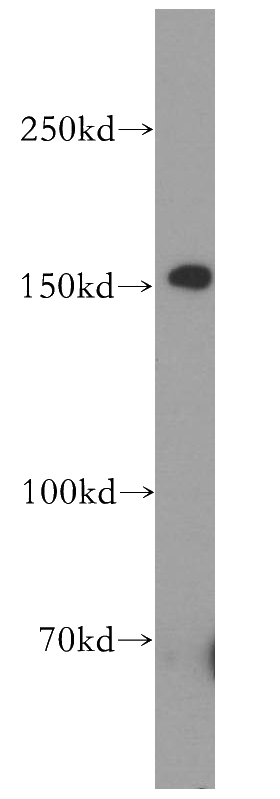
A549 cells were subjected to SDS PAGE followed by western blot with Catalog No:110348(EPHA1-special antibody) at dilution of 1:800
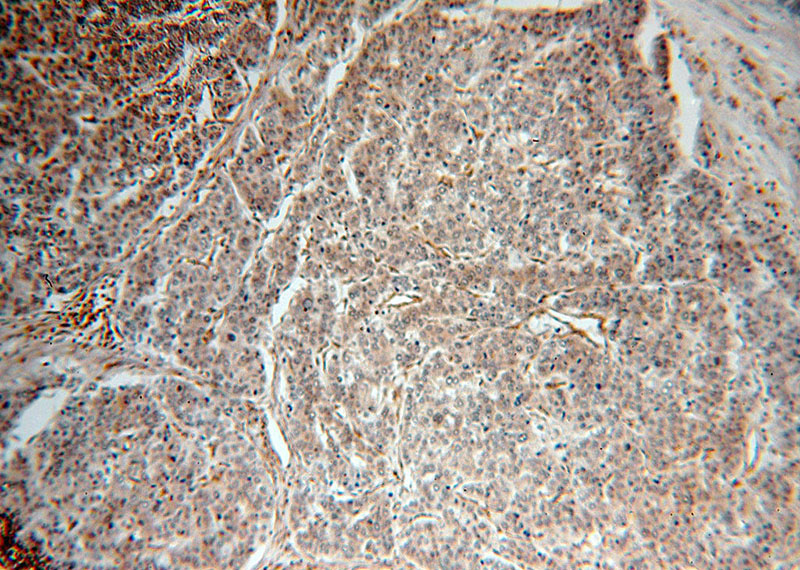
Immunohistochemical of paraffin-embedded human liver cancer using Catalog No:110348(EPHA1-special antibody) at dilution of 1:100 (under 10x lens)
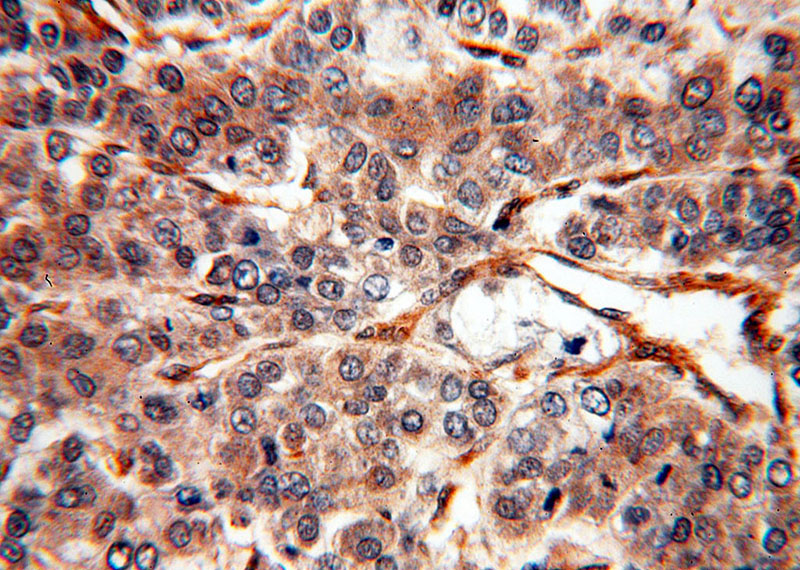
Immunohistochemical of paraffin-embedded human liver cancer using Catalog No:110348(EPHA1-special antibody) at dilution of 1:100 (under 40x lens)
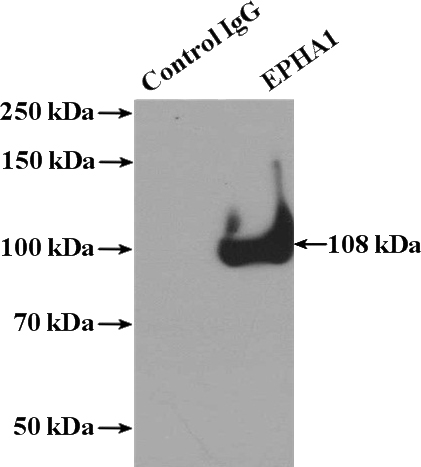
IP Result of anti-EPHA1-special (IP:Catalog No:110348, 4ug; Detection:Catalog No:110348 1:500) with HeLa cells lysate 3200ug.
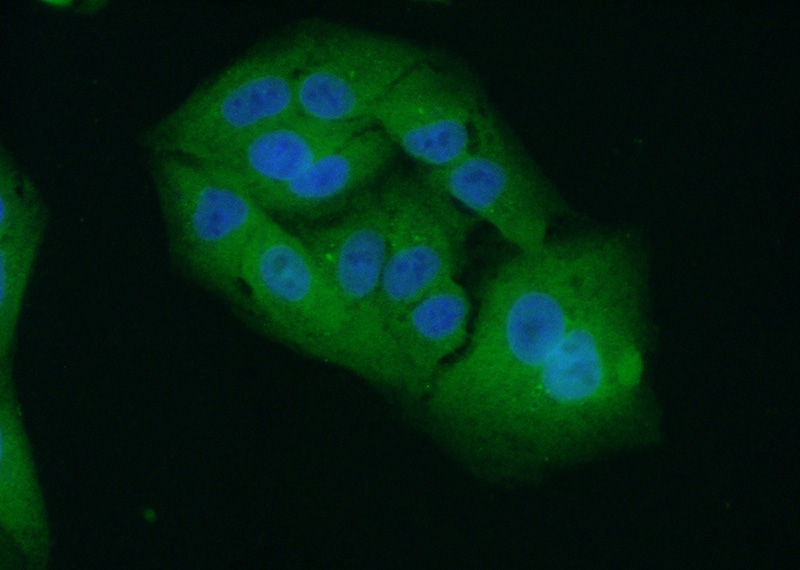
Immunofluorescent analysis of (10% Formaldehyde) fixed A549 cells using Catalog No:110348(EPHA1-special Antibody) at dilution of 1:50 and Alexa Fluor 488-congugated AffiniPure Goat Anti-Rabbit IgG(H+L)
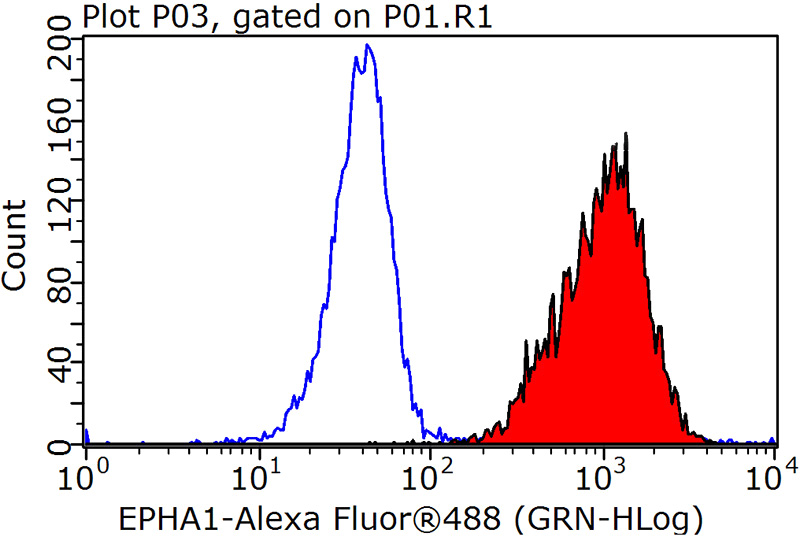
1X10^6 HeLa cells were stained with 0.2ug EPHA1-special antibody (Catalog No:110348, red) and control antibody (blue). Fixed with 90% MeOH blocked with 3% BSA (30 min). Alexa Fluor 488-congugated AffiniPure Goat Anti-Rabbit IgG(H+L) with dilution 1:1000.
-
Background
EPHA1, also named as EPH, EPHT and EPHT1, belongs to ephrin receptor subfamily of the protein-tyrosine kinase family. EPH and EPH-related receptors have been implicated in mediating developmental events, particularly in the nervous system. Receptors in the EPH subfamily typically have a single kinase domain and an extracellular region containing a Cys-rich domain and 2 fibronectin type III repeats. Ligands in the ephrin-A subclass, including the prototype family member ephrin-A1 (B61), are membrane associated through glycosylphosphatidyl-inositol linkages, whereas ephrin-B subclass consists of ligands with transmembrane domains. The general role of the Eph family is in mediating repulsive cell-cell interaction.
Related Products / Services
Please note: All products are "FOR RESEARCH USE ONLY AND ARE NOT INTENDED FOR DIAGNOSTIC OR THERAPEUTIC USE"
